Review: Polarisasi, Indonesia's Contemporary Answer to Hamilton
The original musical ran for 5 shows on February 2-4.
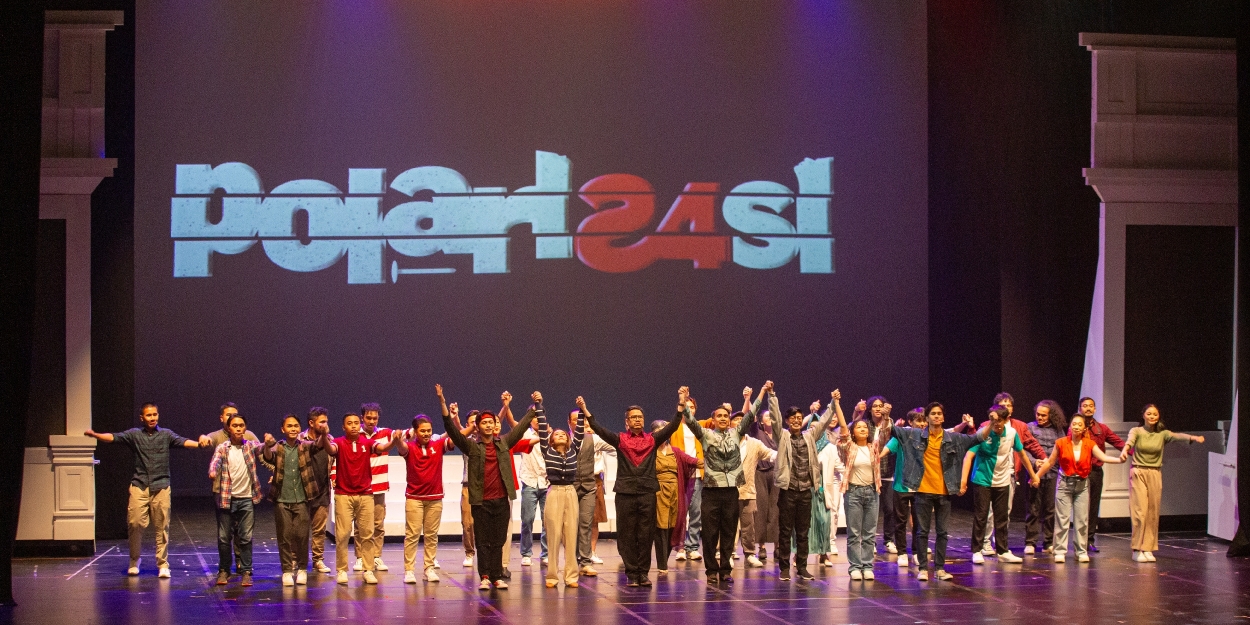
As another Indonesian presidential election comes, political tension grows. People split into increasingly polarized factions, fueled by campaigns, buzzers, and the media. The original musical Polarisasi, created by brothers Jovial “Jovi” da Lopez and Andovi da Lopez, dissects this trend. Said to be inspired by Broadway megahit Hamilton, the show ran for 5 shows on February 2-4 at Graha Bhakti Budaya, Taman Ismail Marzuki.
The script is written by Jovi, Andovi, Bintang Pradana, and Dian Amalia Ariani, with Jovi and Andovi also directing the show. The lead creatives also include Sandy Oey as choreographer, Florencia Angel Caroline as head of the music team and songwriter, and Siska Napitupulu as the vocal director.
Polarisasi is set in a fictionalized version of Indonesia, where two presidential candidates are gearing up for the upcoming election: candidate number one, Reska Denasmarka (Jovial da Lopez), and candidate number two, Adikara Tjokro (Andovi da Lopez). With their own passionate campaign team and scheming political backers, the two seem to be evenly matched.
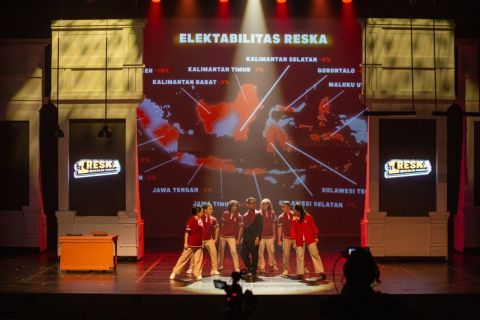
As both candidates try to garner more votes, a group of college students is tasked with doing an assignment that will have actual impact. Raka (Gerry Gerardo) is the team leader, accompanied by the business-minded Bara (Alvin Lapian); the uptown Tere (Kezia Aletheia S.); the meek and pious Rizal (Aulion); and the strong-willed Eastern Indonesian, Grisella (Jennifer Kristi Rengka).
After some brainstorming, the fivesome agrees to base their project around replanting trees in Grisella’s hometown of Flores, Nusa Tenggara Timur, which has seen increased drought and floods due to deforestation. The team tries to find ways to fundraise for their project, entitled TT NTT.
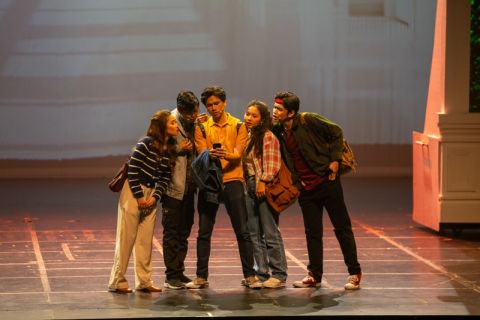
Meanwhile, as the ebbs and flows of political surveys come to light, the two candidates scurry to secure more votes. Reska, who runs on a platform of pluralism and making Indonesia a global force, relies more on the media; he appears on a sensationalist podcast by Jody (Coki Pardede), organizes a ‘pluralism festival’, and, eventually, works with an unscrupulous social media agency led by Alan (Nino Prabowo), who seeks to imperceptibly influence people’s opinion on Reska by showing them the right social media posts as according to their perceived personality.
As for Tjokro, who promises to eliminate corruption and increase national prosperity, he relies more on his political party and, especially, its chairwoman: the cunning political veteran Bestari (Ade Rianom). She has but one piece of advice to offer Tjokro: make a lot of enticing political promises. After all, she muses, ‘who will collect your promises once you’re elected?’.
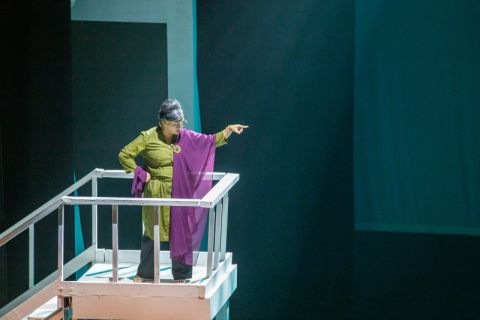
The college students find themselves intertwined with the political drama in two major ways: first, Raka’s TikTok videos get millions of views from covering the political circus, especially by taking Reska’s statements out of context – this, in turn, earns him money to put into their project funds. Secondly, they cross paths with Tjokro at an exhibition, and he promises to donate to their cause, yet Bestari forbids him because the reforestation plan would inhibit their party’s investors from extracting more natural resources around Flores.
All these turmoils come to a head during a big protest; Reska has been accused of supporting the LGBTQ+ community (a hot topic of contention in Indonesia) due to an old photo surfacing from his college days, a machination of Bestari as a last-minute effort to give Tjokro the edge. With legions of people protesting, chaos swells; physical altercation with the police force becomes unavoidable. The pandemonium reached a feverish pitch.
Finally, the crowd parts, revealing a lifeless body: Rizal. The gentlest member of Raka’s team has lost his life in the disaster; perhaps due to asphyxiation, blunt force, or simply getting crushed between the sea of bodies.
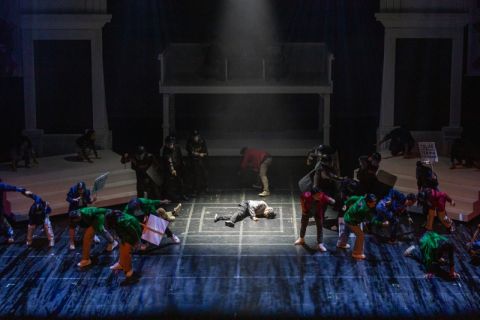
After the dust settles, Rizal’s friends mourn his passing, while the two candidates make speeches about the unfortunate incident. The curtains come to a close as the cast once again sings ‘hati-hati polarisasi’, or ‘beware of polarization’.
Polarisasi has lofty ambitions. First and foremost, as the title song goes, it hopes to warn Indonesian voters of the increasing polarization, especially masterminded by those up high with vested political interest.
How the duo of Jovi and Andovi set out to do this is intriguing. They showed the behind-the-scenes machinations of intricate political machines, yet both candidates are shown to be earnest people, honestly trying to lead and better the nation. Nevertheless, Reska and Tjokro are similarly powerless against the wills of the political parties and figures behind them.
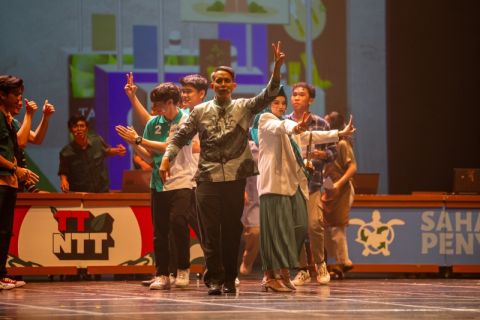
It is indeed very interesting to see how Polarisasi chooses to show the complex, interwoven webs of ambitions and agendas, bigger and more powerful than any individual candidate. Its all-consuming and nearly incomprehensible nature is almost Lovecraftian. It’s a good way to open the audience’s eyes to the forces behind the promises and grandstanding that the people see.
That being said, the musical is perhaps too optimistic in portraying the candidates themselves. They are mostly selfless, and even powerless, amidst everything. This paints the candidates themselves as tragic figures and glazes over their personal ambitions, if there is any.
I believe there is potential in showing more of what they actually want and believe as individuals, what’s at stake for them personally, why they decided to become a presidential candidate, and how that clashes with what their puppet masters require of them. It would make Reska’s final act of defiance – confession that he worked with the social media agency to influence public opinion – more impactful.
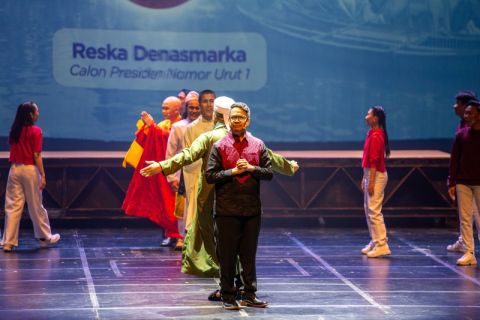
On the other hand, the story of the college students serves as a decent contrast to the politicians. It shows just how the false promises of politicians can affect the daily lives of regular citizens.
However, it feels like there’s missed opportunity in making the cause-and-effect more direct. Although Tjokro did end up not donating to TT NTT, it wasn’t shown to have a direct negative impact on the people of Flores.
And even Rizal’s untimely death felt more like an unfortunate incident; although it might be made to reflect the unforeseen consequences of political events or crowd behavior (bringing to mind the Kanjuruhan disaster), it’s a shame that it’s not more tightly tied to the build up of political tension so deliciously ramping up throughout the show. I believe if the tragedy was actually a more direct consequence of the choices made by the characters (and not by a combination of faceless mob and poor crowd control), it would have elevated the musical’s emotional core to a new height.
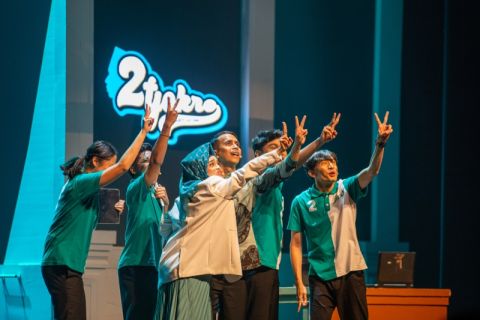
Furthermore, the ambition and passion in Polarisasi might have made the musical just a bit too humongous. Coming at around three and a half hours, it is an astounding achievement that the musical never really dragged, owing to the great pacing of both the script and the direction. However, many of the issues raised never really got solved. Perhaps there was not enough time nor words to really bring everything to a satisfying conclusion, just like in real life.
Nevertheless, as a crafted narrative, there was potential to seize the chance and give a more conclusive ending to the different subplots and characters. We got to follow these characters for more than 3 hours, after all; it’s natural to want to know where their decisions ultimately lead them to. Some developments also felt too rushed, particularly Raka and Bara’s decision to confront people calling the former a buzzer on the internet (which led to them paying bribes to be let go by the police), which came across as a gross overreaction.
But perhaps it is the journey and not the destination that counts most. Polarisasi is immensely relatable. As lifelong content creators, Jovi and Andovi know how to write content that would resonate with the Indonesian audience, and the results speak for themselves. Laughs and cheers filled the theater constantly.Some stand out moments include all of Bestari’s scenes (evoking a well-known political matriarch), Tjokro promising free lunches (a promise also made by a real life candidate, which led to many discourses and memes), the euphemistic name of TT NTT, the familiar Arabic phrases uttered by Rizal so sincerely, and so many more.

Polarisasi’s music, meanwhile, is literally and figuratively a mixed bag. The songs overall sound contemporary, with a few obvious inspirations from Hamilton in particular. There are catchy upbeat songs, touching ballads, and there’s a particularly inspired musicalized version of the multi-religious greeting used by government officials (a cute Indonesian quirk in trying to be as inclusive as possible to live up to our ‘Unity in Diversity’ national slogan).
Some songs have awkward breaks in its composition, sometimes even making the audience applaud too early just for the song to continue for a few more bars. Some have lyrics that could use a rewrite or two, as they are perhaps too brutish for a political drama. This also reflects the problem with some character writings – while most of the players in this show are shown to be multifaceted, there are a few antagonistic characters who are almost villainous caricatures. A more consistent tone would help the musical to have a more solid identity.
The sound design and engineering is hugely fine. There is an additional choir that helped create a fuller sound, which is a good choice considering the show’s scale, often having dozens of people on stage. Most of the dialogue and singing could be heard without problem (which is not always a given), and that helped keeping the audience immersed.

On to the performances, Polarisasi’s cast consists of both public figures more known for their internet or TV presence (such as Jovi, Andovi, Kezia, Coki) as well as theater actors (such as Gerry, Ade, and the ensemble). Acting-wise, the cast puts on an impeccable performance. The da Lopez brothers deserve praise for embodying their respective characters – charismatic leaders with a sense of vulnerability to them. Although at times the candidates felt quite similar in character, that was due more to their writing rather than the acting. That being said, neither of them are the strongest vocalists, especially compared to some other cast members, but it worked fine as none of their songs really required extraordinary vocal ability either.
The supporting cast on the political side played their roles greatly to either support or contrast the presidential candidates. On Reska’s main campaign team we have the sly Dhea Seto, Alvano Ricky, and Ariel Marcelino, typically trying to goad Reska into making deals with unsavory characters to boost his votes. And on Tjokro’s team we have the delightfully Sundanese Leyla Aderina Putri, alongside Boas Daniel Hugo and Mitch Hadju.These groupies really helped to highlight the candidate’s high and low points with their spirited acting.
.
The more satellite characters also deserve mentions. Ade Rianom’s Bestari had a scene-stealing number in ‘Janji Palsu’ (‘False Promises’) which showcased her formidable vocal chords and her deliciously sinister character. Nino Prabowo as Alan is really slick and sly, although, as mentioned, the character could perhaps use a bit more subtlety to make his threatening power feels more realistic – but the actor played it to perfection as written. And the famous comedian Coki Pardede also played the evil podcaster Jody with surprising finesse, selling how these unsavory clout chasers talk.

The rest of the ensemble cast (Rendhy Fabian, Cheryl Mesa B. Pascal Meliala, Barley Armandita, Mumu Harmoun, Robertus Darren, Louis Albern, Bryan Pattipeiluhu, Ezechiel Litaay, Andreas Prasetya Putra, Putra Pamungkas, and Grandis Tenar) also accomplished their job flawlessly, portraying Indonesians from different walks of life as according to what each scene required of them.
As for the five students, it was refreshing in how natural their dialogues felt. Although slightly dramatized for the stage, the conversations felt genuine and it was easy to tell their characters apart without turning them into caricatures.
Gerry’s Raka and Jennifer’s Grisella were both given hearty dilemmas to sink their teeth into – for Raka, it’s between TikTok fame and pursuing the truth; for Grisella, it’s between pursuing their group project to help her hometown and furthering her career in the (often dirty) media landscape. The two also got into a romantic relationship, which added another layer of depth to their conflict. Gerry feels right at home playing the clean-cut, youthful heartthrob trying to find his place in the world. And Jennifer is a revelation, injecting much needed passion to her character, while bringing beautifully powerful vocals. It’s also refreshing to see Eastern Indonesians represented on stage with a character full of complexity and charm (although her accent faltered throughout the middle part of the show, it didn’t detract too much from her performance).
Bara was a great foil to Raka, constantly nudging him to pursue the allure of fame and fortune. Rizal was a sweetheart and was a character unabashedly proud of his religious upbringing without making him unbearable. The socialite Tere also had a surprisingly emotional hidden depth (her family was deeply affected by the 1998 political turmoil). The five played off each other really well, making them a joy to watch.
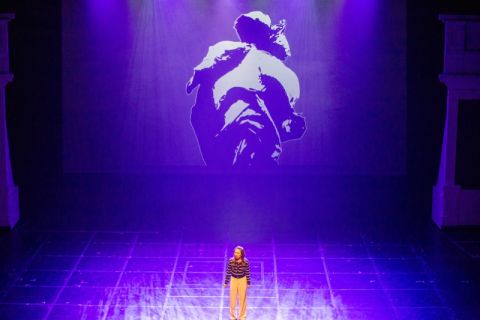
In terms of production design, Polarisasi’s scenic design includes a lot of screens. They are used to portray in-story electoral survey updates, TikTok videos, podcast recording, and more. It really goes to demonstrate just how inseparable the media is from the election in this era of information and misinformation. Otherwise, the clad white set pieces are perfunctory, although with one big exception: a tall ladder where Bestari stands on, symbolic of her nigh-omniscient status. The lighting, similarly, plays a mostly supporting role, although there is one memorable moment where Reska shakes media mastermind Alan’s hand and they become but silhouettes, signifying Reska’s embrace of the dark side.
So, can Polarisasi become Indonesia’s own Hamilton?
The one who can answer that is the audience. But I can say that it has some very solid foundations for success. The story is immensely relatable. It has a lot to say about important issues without making it too uncomfortable for anyone. Some of the songs are catchy. The performances are solid. It has the backing of influential people.
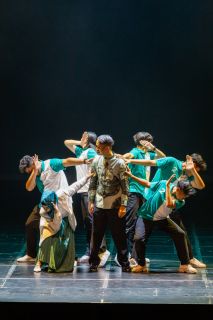
More importantly, as of the writing of this review, the creators have indicated that there will be a rerun of Polarisasi. Having reruns is still a rarity among musicals in Indonesia, and especially so for an original IP. By itself, it bodes well for the show’s future, although one might question if a musical immersed in such a specific time and mood will have the necessary longevity. In Indonesia, the results of the vote are rolling in and some people might be getting fatigued by being so invested in the elections for months already.
Creatively, there is still some room for improvement, if the showrunners hope to polish the musical to its fullest potential. But even in its current form, Polarisasi is a monumental achievement. It’s ambitious, vivacious, and brimming with potential. It resonates with the audience. I guess one could even say that Polarisasi is just like its country: young, scrappy, and hungry.
Reader Reviews

Videos
